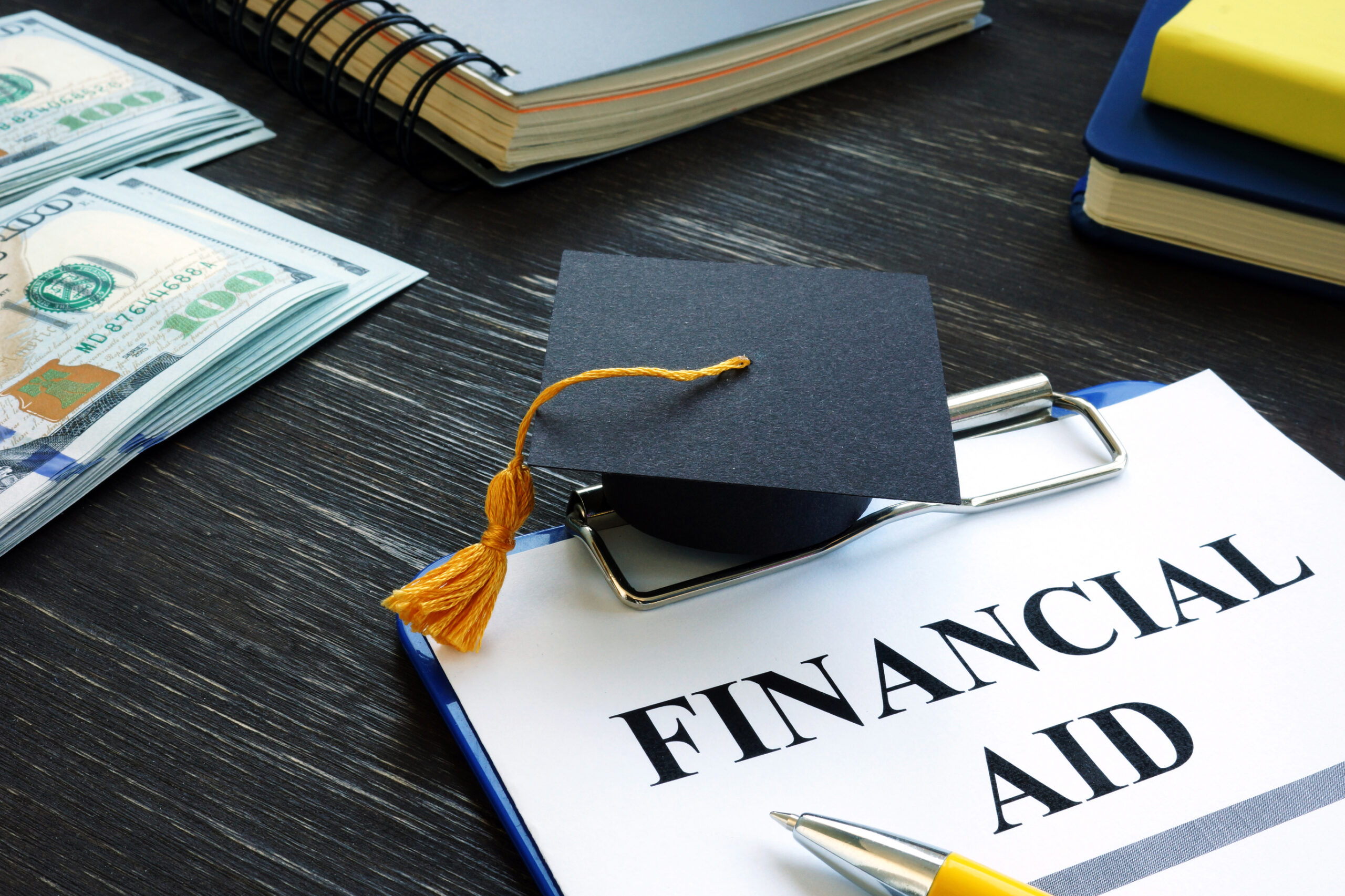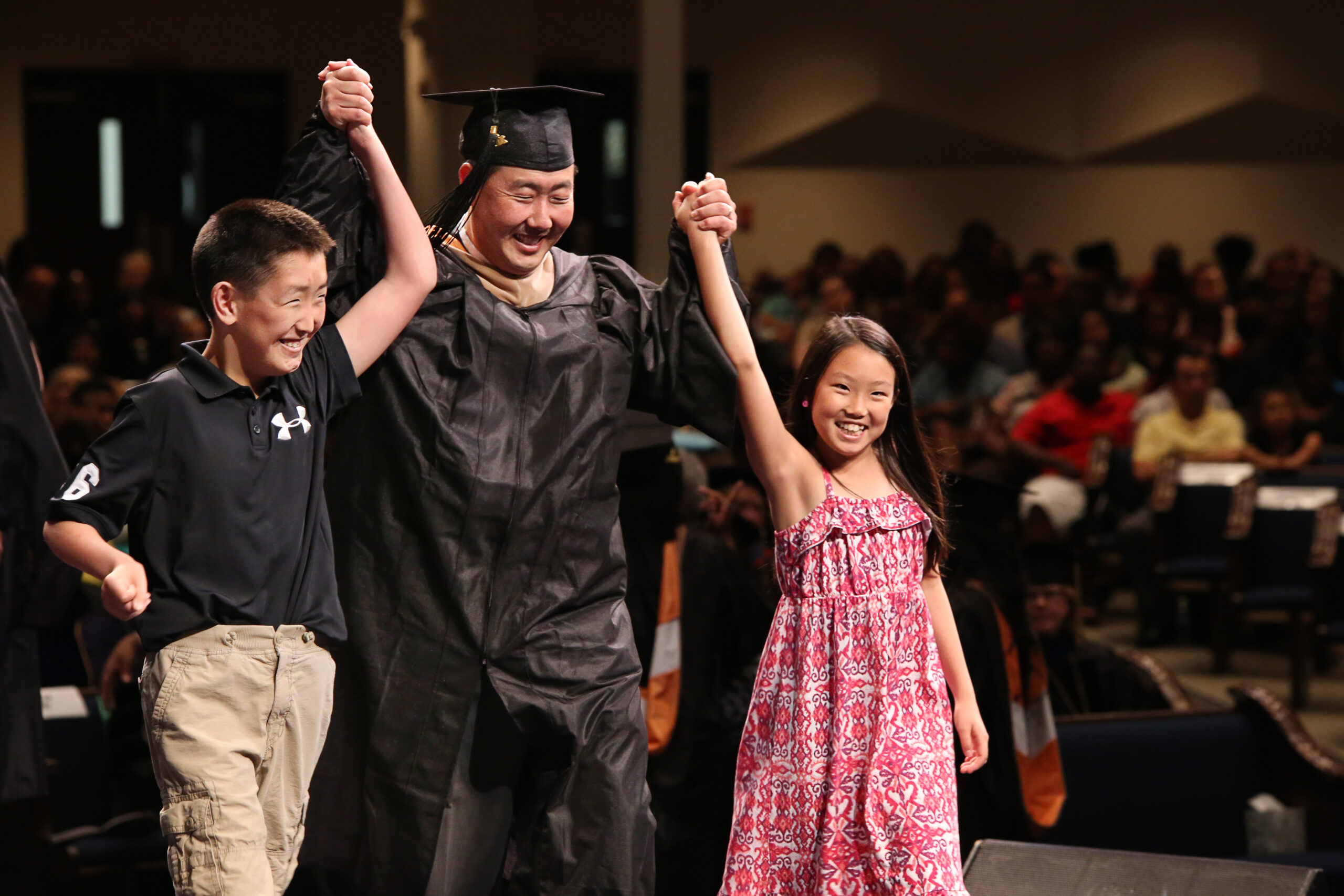

The following links provide important information about Amberton University, as required by the Higher Education Opportunity Act of 2008. Further information can be found in the University Catalog and Student Handbook. Questions can also be directed to advisor@amberton.edu.

General Information
College Navigator Profile
Amberton University’s College Navigator Profile
College Navigator - Amberton University
Textbook Information
Textbook Information can be found in each of the course syllabi.
Prior to the beginning of registration for a session, the University makes all course syllabi for the session available through the University’s Course Guide. A student can search for a specific course to review the syllabus. A student should NOT register for a course until he/she has carefully read the course syllabus. Minimally, a course syllabus identifies:
- course prerequisites
- course competencies
- texts and materials required for the course, including ISBN
- the course outline
- assignments and grading criteria
- remote access technologies to be employed, when appropriate
- methods for contacting the instructor outside of class
- research resources available
Textbooks can be purchased through the Amberton Online Bookstore.
Amberton Online Bookstore
Requirements for Withdrawal
A withdrawal from the University is a complete official severance for the session. Merely ceasing to attend class(es) does not constitute an official withdrawal.
To be considered official, the withdrawal must be in writing and signed by the student requesting the withdrawal; no withdrawal is accepted verbally. The written notice submitted by the student must contain the
student’s name, signature, I.D. number, and course(s) to be dropped. The notice may be faxed, mailed, e-mailed, or hand-delivered to the University. The official date of the withdrawal is the date the written notice is formally received by the University, NOT the postmarked date or the date stated in the notice. The University’s record concerning a withdrawal is indisputable unless the student can provide reliable evidence of an earlier receipt date. If the exact withdrawal date is critical to the student, it is recommended that the student send the withdrawal by registered mail. The student has thirty days following the close of a session to provide evidence for any grade disputes concerning withdrawals. All admission and academic records of the student are the property of Amberton University and will remain on file for three years. A former student who withdrew in good standing will be allowed to re-enroll without applying for re-admission during these three years.. After three years of non-attendance, the student must reapply for admission to Amberton University.
WITHDRAWAL FROM A CLASS DURING THE SESSION
A student who officially withdraws from a class during the first week of the session will be entitled to a full refund of tuition. A student who withdraws from a class after the first week will be credited on a refund schedule that is based on the beginning date of the session and continues for five consecutive weeks. Late registration and/or class absences are not considered exceptions to the refund policy. Refer to the Schedule of Classes for the exact refund policy. To be considered official, the class withdrawal must be in writing and signed by the student requesting the withdrawal; no withdrawal is accepted verbally. The written notice submitted by the student must contain the student’s name, signature, I.D. number, and course(s) to be dropped. The notice may be faxed, mailed, e-mailed, or hand-delivered to the University. The official date of the withdrawal is the date the written notice is formally received by the University, NOT the postmarked date or the date sent in the notice. The University’s record concerning a withdrawal is indisputable unless the student can provide reliable evidence of an earlier receipt date. If the exact withdrawal date is critical to the student, it is recommended that the student send the withdrawal by registered mail. Confirmation of a class withdrawal will be mailed to the student within three working days of receiving the official notice. In the event a withdrawal confirmation is not received by the student within three working days, the student is to contact the University’s Student Services Office. In the event a refund results in a credit balance on the student’s account, the credit balance will remain on file until the student notifies the Business Services Office, in
writing, of its disposition. Refunds originating from a credit card payment may be credited only to the credit card account. If Title IV funding is received by the student, the University will adhere to the R2T4 policy
(www.amberton.edu/help-and-advice/r2t4.html) as stated in the Financial Aid Handbook (http://www.amberton.edu/choosing-amberton/tuition/financial-aid.html), as it relates to withdrawals, credit balances and refunding money to the proper entity.
RECORDKEEPING FOR WITHDRAWALS
An approved withdrawal from a class during the session will be noted on the student’s transcript by a W (noting withdrawal) in the grade field of the course enrolled. A withdrawal is not counted when reporting hours completed or grade point average.
Facilities and Services Available for Students with Disabilities
Amberton University is designed for the working adult. The average age of the Amberton student is 40 years old. According to these factors, the facility and services offered are aligned to accommodate students who can function in the workplace. While limited funds and no federal or state support limits the reasonable accommodation Amberton University can provide to disabled students, the institution continues to develop its facilities and services to meet the needs of disabled, working adults. All students at Amberton receive the same amount of instructions and the goal is to accommodate the disabled student to the level of learning of all students.
ADA Disability
Financial Aid
Student Rights and Responsibilities
When you receive financial aid at Amberton University, you assume certain rights and responsibilities.
You have the right to:
- Apply for additional assistance within regulatory guidelines when increased financial need can be demonstrated and funds are available.
- Appeal a decision regarding your financial aid eligibility.
- Expect and receive confidentiality of your financial aid award information on file in the Office of Financial Aid.
- Reapply for financial aid eligibility each year within the guidelines of the Office of Financial Aid satisfactory academic progress standards.
You have the responsibility to:
- Report any change in your financial situation from that reported on the Free Application for Federal Student Aid (FAFSA).
- Notify the Financial Aid Office of changes in the number of hours you are enrolled during any semester of any academic year in which you receive aid in writing.
- Report any education loans, grants, scholarships, or fellowships received from sources other than Amberton University.
- Not engage in the unlawful manufacture, distribution, dispensation, possession, or use of a controlled substance.
- Attend class on a regular basis and to make normal progress toward graduation (repeated withdrawals from courses will jeopardize your eligibility to receive financial assistance).

Student Outcomes
Student Achievement Information
The Amberton University Office of Institutional Research and Effectiveness publishes information relating to the achievement of the University’s students. Amberton University evaluates success with respect to student achievement consistent with its mission.
Institutional Research Effectiveness
Miscellaneous Information
Copyright Infringement and File Sharing
Is Downloading Copyrighted Material Against the Law?
- If you are downloading music/movies or other copyrighted material using Peer-to-Peer (P2P) file sharing technology, you are potentially breaking the law. Peer-to-Peer file sharing of copyrighted works without the permission of the copyright holder is called copyright infringement.
- The Copyright Act grants copyright owners the exclusive rights of reproduction and distribution of their material. When you download a copyrighted song, you are violating reproduction rights; when you share music files, you are violating distribution rights.
- Civil Fines range from $750 to $150,000 for each infringed work, depending on the willfulness of the infringement.
- The Recording Industry Association of America is aggressively suing individuals who illegally participate in illegal peer-to-peer file sharing on the Internet. Hundreds have been sued and many defendants are college students.
Civil and Criminal Penalties for Violation of Federal Copyright Laws
Copyright infringement is the act of exercising, without permission or legal authority, one or more of the exclusive rights granted to the copyright owner under section 106 of the Copyright Act (Title 17 of the United States Code). These rights include the right to reproduce or distribute a copyrighted work. In the file-sharing context, downloading or uploading substantial parts of a copyrighted work without authority constitutes an infringement.
Penalties for copyright infringement include civil and criminal penalties. In general, anyone found liable for civil copyright infringement may be ordered to pay either actual damages or “statutory” damages affixed at not less than $750 and not more than $30,000 per work infringed. For “willful” infringement, a court may award up to $150,000 per work infringed. A court can, in its discretion, also assess costs and attorneys’ fees. For details, see Title 17, United States Code, Sections 504, 505. Willful copyright infringement can also result in criminal penalties, including imprisonment of up to five years and fines of up to $250,000 per offense.
For more information, please see the website of the U.S. Copyright Office at www.copyright.gov
Legal Alternatives
- iTunes provides you with the largest selection of legal music, video, and audio books to purchase and download to your computer.
- Amazon also has a store that provides legal copies of digital books and music.
- Consider using sites like www.hulu.com or www.nbc.com to watch movies and TV episodes.
Responsible Use for Information and Technology Resources
USE OF AMBERTON UNIVERSITY’S TECHNOLOGIES
The purpose of this regulation is to establish and promote the ethical, legal, and secure use of computing and electronic communications for all members of the Amberton community. This regulation will be reviewed annually by the Offices for Strategic Planning and Administrative Services.
SERVICE
The use of the University’s computer, network and system services are considered extraneous to the educational process and the University is not obligated to provide such services or to maintain such services. Students taking distance-learning courses may be directed to utilize alternative communication systems (mail/telephone/email providers/etc.) at the discretion of the University.
PRIVACY AND ACCESS
All files, e-mails, and records held by Amberton University technologies are the property of Amberton University and may be viewed, reviewed, downloaded, or deleted at the discretion of the University’s administration.
The University may find it necessary to access and disclose information from computer and network users to the extent required by law or to uphold legal agreements or University policies, and to diagnose and correct problems in network or systems performance. Because of this, no user of Amberton computing resources or electronic communications systems should consider their messages or files private. In addition, because of the volatile nature of digital information, and the possibility of system failures, and possible software or hardware problems, no user should consider that their messages or files are secure or preserved.
The diversity of information published and available on the Internet includes controversial material. Amberton believes that access to valuable information and interaction on a global scale outweighs the possibility of encountering material that is inconsistent with the University’s purpose. Therefore, the University assumes no responsibility for monitoring or restricting access to material freely published on the Internet. The University does, however, reserve the right to limit access to its networks and computers, and to limit access to or remove links and materials stored on University computers and networks as deemed appropriate by the University.
Only University authorized devices may be connected to the University’s network (LAN or WAN). Authorized devices include University servers, office desktop computers, laptops and network appliances used in the day-to-day operations of the University. Faculty may, as a part of the instructional process, connect to the network in a classroom setting for Internet access. Any attempt to disrupt network operations of the University or to use the University’s network or equipment for personal gain or non-educational purposes is prohibited and may be punishable by termination of employment (for employees) or suspension (for students).
RESPONSIBLE AND ACCEPTABLE USE
Amberton University owns and operates the campus network to provide services that directly support the educational goals of the University. Use of Amberton University’s technologies outside of direct educationally related activities is forbidden unless permission has been granted by the Administration of the University. No user may use these services for commercial ventures, political causes, outside organizations, solicitation, or any venture not directly related to the educational mission of Amberton University.
The use of Amberton’s computer and/or network services is governed by policies prohibiting any type of harassment (sexual, racial, political, religious or national origin) or any other type of abusive behavior. All such violations shall be subject to immediate disciplinary action.
Use of any copyrighted material, whether text, digital image, audio, or video, via the University’s network and/or systems is subject to all restrictions imposed by the copyright law. Individual users will be held accountable for violating copyright restrictions or Amberton’s copyright policy.
Amberton purchases site licenses for software used on campus machines and on its networks. Individuals who knowingly make, acquire, or use unauthorized software on Amberton University’s premises or equipment shall be subject to immediate disciplinary action.
Users are responsible for maintaining current virus protection on their systems, and for implementing virus checks of any downloaded files from Amberton. Users who do not follow these procedures and/or who knowingly spread computer viruses shall be subject to disciplinary action. Deliberate attempts to degrade or disrupt Amberton’s computers, network and/or systems will be viewed as criminal activity under applicable state and federal law.
Any user may be denied access to Amberton’s computers, networks, and/or systems when, in the judgment of the University, the user is a security risk, unqualified, or unfit to use such services. The use of the University’s computer, network and system services are considered extraneous to the educational process and the University is not obligated to provide such services or to maintain such services. Students taking distance-learning courses may be directed to utilize alternative communication systems (mail/telephone/email providers/etc.) at the discretion of the University.
REPORTING VIOLATIONS
Anyone who observes or experiences a violation of Amberton’s policies on computing and electronic communications should report the violation to the Chief Technical Officer. Violations will generally be treated in the same manner as violations of other University policies. If violations appear to constitute a criminal offense, as defined by local, state, or federal statutes, the appropriate authorities will be notified.
SYSTEM OPERATORS OF AMBERTON UNIVERSITY TECHNOLOGIES
System Operators (SYSOP) are appointed to operate and maintain the integrity of the Technological Systems of Amberton University. SYSOPS of Amberton University are of faculty rank and have jurisdiction in allowing or denying access to the Systems. Appeals of SYSOP decisions may be filed by following the appeal process as outlined in the University’s official catalog. All University technology is under the authority of the University’s Chief Technical Officer.
Wireless Network Acceptable Use
The Amberton University Wireless Network (AU Wi-Fi) is the on-campus wireless internet network for both the Garland Campus and Frisco Center. Through AU Wi-Fi, students, faculty, and staff can access the Internet. Access to AU Wi-Fi is a privilege and not a right. All students, faculty, and staff are expected to practice responsible computing and to adhere to these requirements for acceptable use when accessing AU Wi-Fi:
- Users are prohibited from using AU Wi-Fi in a way that violates state or federal law or violates the policies of Amberton University.
- Access to AU Wi-Fi is controlled by use of a pass code. Only authorized students, faculty, and staff will be given access to the pass code. Users are not to share the pass code with unauthorized users. Pass codes can and will be changed without prior notice. Authorized users may obtain a valid pass code in the Library Resource Center – Garland Campus, Student Services – Garland and Frisco.
- The AU Wi-Fi System is for Amberton University-related use only. It is not to be used for any commercial purpose or to host data services for other individuals or groups.
- Users are not to attempt to deceive others regarding their identity in electronic communications. Attempts to harass, threaten, or intimidate other individuals through use of AU Wi-Fi will not be tolerated.
- Users are not to access or attempt access to accounts, files or other information belonging to Amberton University or other AU Wi-Fi users or internet users without explicit consent.
- Users are required to comply with United States copyright law and the copyright policy of Amberton University. Copying, downloading, or electronic transfer of copyrighted materials without the authorization of the copyright owner is against the law and may result in civil and criminal penalties, including fines and imprisonment.
- Users are expected to maintain and use an up to date virus software package on all computers used to access AU Wi-Fi. Any attempt to spread or introduce viruses to the system will be considered a violation of the Amberton University Code of Ethical Conduct.
- Network capacity is limited. If your AU Wi-Fi connection uses excessive bandwidth, sends disruptive signals, or violates any of the above policies, it will be subject to disconnection. Any use or misuse of the connection that constitutes a violation of Amberton University regulations may result in administrative or disciplinary action, including probation, suspension, or expulsion.
Security Monitoring
AU Wi-Fi is subject to monitoring for security, legal or trouble-shooting purposes. This may include monitoring for bandwidth usage, security related incidents, or a request from legal/law enforcement authorities. In addition, Amberton University reserves the right to scan the network to assist in identifying and protecting against exploitable security vulnerabilities in efforts to preserve network integrity.
Policy Changes
The AU Wi-Fi Acceptable Use Policy is subject to change without notice.

